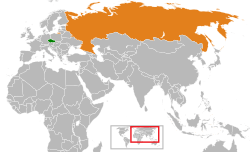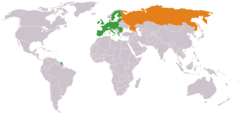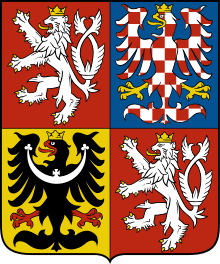Czech Republic–Russia relations
 | |
Czech Republic |
Russia |
|---|---|
Czech Republic–Russia relations refers to the bilateral foreign relations between the Czech Republic (European Union (EU) member) and Russia (CIS member). While the bilateral trade between the countries reaches billions of US dollars per year, the relations are also shaped by Czech Republic's membership in NATO and the EU, giving a prominent role to the Russia–European Union relations and NATO–Russia relations. The Czech Republic participates in economic sanctions against Russia following the Russian military intervention in Ukraine from 2014. Ongoing tensions in the late 2010s have been described as the Cold War II.
Both countries are full members of the Council of Europe and the Organization for Security and Co-operation in Europe. The Czech Republic has an embassy in Moscow, and two consulates general (in Saint Petersburg and Yekaterinburg). The Russian Federation has an embassy in Prague, and two consulate generals (in Brno and Karlovy Vary).
History
During the entire medieval period and early modern period, the Czech lands, in the form of Duchy of Bohemia and Kingdom of Bohemia, were aligned with the Holy Roman Empire and later Austrian Empire. During the first half of the 20th century, Czech-Russian relations were formalized as Czechoslovakia–Soviet Union relations.
After World War II, when Communist Party of Czechoslovakia took over the control of the country through a Soviet-backed 1948 Czechoslovak coup d'état, Czechoslovakia became part of the Eastern Bloc through Warsaw Pact with Soviet Union and eastern and central European socialist countries. On August 21, 1968 following the Prague Spring pro-democracy reforms of the Czech government, the Soviet-led invasion re-established the Communist regime by force. 108 Czechs and Slovaks died and approximately 500 were wounded as a direct result of the invasion. The invasion stopped the Communist Party of Czechoslovakia from making democratic and liberal reforms, and politicians loyal to Moscow gained control again. This damaged relations between the two countries.
After the Velvet Revolution of 1989, the independent Czech Republic joined NATO in 1999 and the European Union in 2004, formally re-joined the political Western world after four decades of absence and re-aligned its foreign policy and economic interests with its Western allies.
On December 7, 2011, Russian president Dmitry Medvedev visited Prague, to sign economic contracts and cultural exchange. Both countries consider each other as an important economic partner.
As a response to the Russian military intervention in Ukraine from 2014, the Czech Republic has participated in enacting economic sanctions against Russia. In March 2018, the Czech Republic expelled three Russian diplomats as a reaction to the poisoning of Sergei and Yulia Skripal in the United Kingdom.[1] In March 2018, The Czech Republic arrested and extradited a Russian hacker into the United States on their request.[2] Ongoing tensions in the Russia–European Union relations and NATO–Russia relations since the late 2010s have been described as the Cold War II.
Trade and economy
Bilateral trade between the Czech Republic and Russia was USD 11.7 billion in 2014, but declined following the 2014 international sanctions during the Ukrainian crisis.[3]
Public opinion
While economic relations were good prior to the 2014 sanctions, and the Czech Republic is a common tourist destination for Russians, the Czech people themselves tend to be distrustful of Russia due to the 1968 invasion, and tend to have a negative opinion of Russians.[4] Russia remains continuously among the most negatively perceived countries among Czechs in polls conducted since 1991, and 26% of Czechs responded that they have a positive opinion about Russia in November 2016.[5]
Russian espionage and propaganda
The Czech intelligence agency Security Information Service reports high levels of Russian espionage in the Czech Republic and highlighted "security risks including an increasing influence by organized crime in the state sector" in a 2007 report.[6] The report also states that "intelligence services of the Russian Federation operating on Czech territory organize media campaigns and other activities supporting Russian interests" and that the Czech Republic has been targeted by Russia due to its membership in NATO and the EU reflecting Russia's interests to acquire information about the functioning of these institutions.[6] Russian influence has targeted especially Russian economic interests in the Czech Republic[7] (i.e. the energy sector),[6] but has also infiltrated into politics and media.[8] The Russian intelligence activity focused on pro-Russian propaganda and on political, scientific, technical and economic espionage.[8]
In 2009, two Russian diplomats were expelled from the Czech Republic due to espionage.[9] As of 2015, according to the Security Information Service, the most active foreign espionage in the Czech Republic originated from Russia, followed by China. As of 2017, there were officially 140 Russian diplomats in the Czech Republic, a disproportionately large number compared to other countries, and also compared to only 65 Czech diplomats in Russia.[10]
According to a 2016 study by the Czech Masaryk University in Brno, pro-Russian websites Sputnik and Parlamentní listy are major sources of Russian propaganda in the Czech Republic; the latter of which is described by the report as a particular source of disinformation along with several other publications.[11] Russian information war focuses on spreading misinformation about the EU and NATO, trying to change public perception of Russia and bribing local politicians.[10] Czech officials estimate that the Russian government is behind approximately 40 Czech-language websites presenting radical views, conspiracy theories and inaccurate reports.[12] According to Tomáš Prouza, the "key goal of Russian propaganda in the Czech Republic is to sow doubts into the minds of the people that democracy is the best system to organise a country, to build negative images of the European Union and NATO, and [to] discourage people from participation in the democratic processes".[12]
In 2017, a special unit, the Centre Against Terrorism and Hybrid Threats, was founded under the Ministry of the Interior to counter the threats from Russia among other issues.[12] Czech investigative journalists publish an up-to date list of pro-Russian publications that include "sources that openly publish Russian propaganda as well as ones that offer Putin's worldview among standard news reporting.[13]
Immigration
There is an immigrant minority of 33 970 Russian citizens with a residence permit in the Czech Republic for a period of 12 months or more, as of 2016. It is the fourth largest immigrant group after Slovaks, Ukrainians and Vietnamese, followed by Germans.[14] Russians have the largest proportion of university educated individuals among other immigrant groups.[15] Most incoming Russians are members of the middle or upper classes and their reasons for migration into the Czech Republic are desire for a life in the European Union, better healthcare in the Czech Republic, high levels of corruption in Russia and also political reasons. Russian immigrants have large proportion of business people in comparison with other immigrant groups.[16]
See also
- Czech and Russian foreign relations
- Foreign relations of the Czech Republic
- Foreign relations of Russia
- List of diplomatic missions of the Czech Republic
- List of diplomatic missions of Russia
- Czech Republic–United States relations
- Russia–United States relations
- Other
References
- ↑ Julian Borger, Patrick Wintour, Heather Stewart. Czechs expel three Russian diplomats after UK chemical attack. Reuters. Published on 26 March 2018.
- ↑ Czech Republic defies Russia, extradites 'hacker' to United States. Deutsche Welle. 30.03.2018.
- ↑ "Czech-Russian Bilateral Trade in 2015".
- ↑ "In Eastern Europe, Pact With Russians Raises Old Specters". The New York Times. 7 April 2010.
- ↑ Milan Tuček. Sympatie české veřejnosti k některým zemím – listopad 2016 (in Czech). CVVM. Published on 5 January 2017.
- 1 2 3 CZECH INTELLIGENCE: HALF OF RUSSIA’S DIPLOMATS IN THE CZECH REPUBLIC ARE SPIES. Czech Radio.
- ↑ Russian Spy Tale Rattles Czechs.
- 1 2 Russian Intelligence Waging Information War, Says Czech Security Service
- ↑ Russia expels 2 Czech diplomats in spy row
- 1 2 John R. Schindler. Putin’s Central European Spy Base. New York Observer. 05/18/17.
- ↑ Analýza „prokremelských“ webů: šíří vlnu zloby a půl procenta soucitu (Czech). Mladá fronta DNES. June 13, 2016
- 1 2 3 Robert Tait. Czech Republic to fight 'fake news' with specialist unit. 28 December 2016.
- ↑ PROPAGANDA MASKOVANÁ BOJEM ZA SVOBODU A DEMOKRACII (in Czech). Neovlivní.cz. 7.11.2016.
- ↑ R07 Cizinci s pobytem nad 12 měsíců podle státního občanství v letech 2008 - 2016 (k 31. 12.)
- ↑ Cizinci v ČR: Vietnamci u nás zakořenili. Czech Statistical Office.
- ↑ Jan Němec. Rusů v Česku stále přibývá. Jsou už třetí nejpočetnější skupinou imigrantů (in Czech). Hospodářské noviny. 2. 11. 2017



